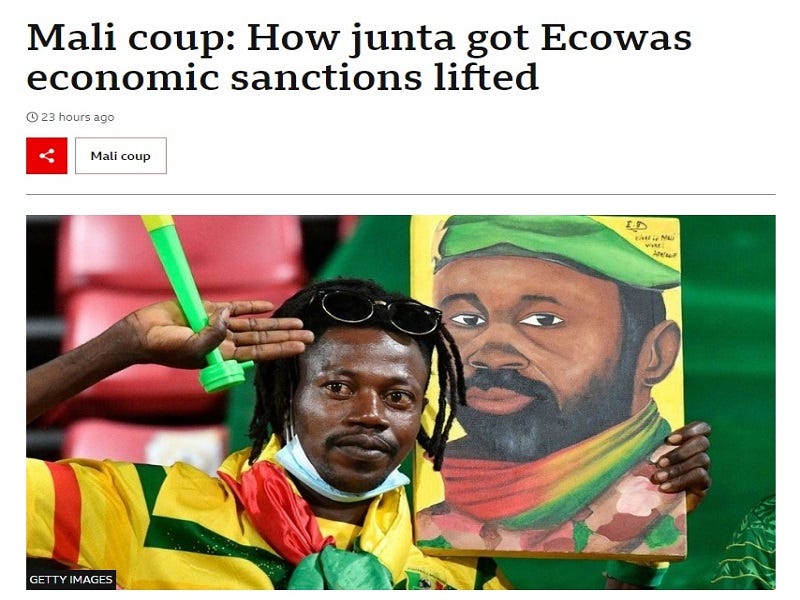The Malian Junta Isn’t A “Defensively Nationalist Regime” But An African Pioneer
The Malian example strikes fear in the hearts of Western leaders since it makes them suspect that some of the same men tasked with enforcing their neo-colonial regimes in West Africa might secretly be anti-imperialist freedom fighters plotting to overthrow these unjust systems from within like that country’s junta clearly was in hindsight.
The BBC condemned the Malian junta as a so-called “defensively nationalist regime” that “cleverly played” on popular perceptions in the region to get ECOWAS to lift its crippling sanctions in a piece that the outlet just published titled “Mali coup: How junta got Ecowas economic sanctions lifted”. It’s nothing a but a hit piece spinning the junta’s valiant defense of objective national interests in the face of ECOWAS’ French-backed neo-imperialist sanctions due to how afraid the US-led West is of the continental example being set by Bamako.
Through “the passage of a new electoral law and arrangements for an elections authority, and a detailed roadmap for the transition, and, above all, a fixed timetable that sets a firm deadline for the first round of the presidential election to take place in February 2024”, the junta convinced this regional bloc to lift its economic restrictions against the country. By defiantly responding to “every tough message from Ecowas or Europe and the United Nations”, they were also able to convince the West African people that ECOWAS is actually working against all of them, which is what really resulted in lifting the sanctions.
After all, ECOWAS purports to act in the name of its member states’ people, ergo the pretext upon which it sanctioned the Malian junta in the first place. The false basis was to “restore democracy” there, yet the latest coup was genuinely popular with the masses who the BBC to its credit accurately reported were eager “for radical change in a country whose traditional elite had supposedly been rotted by corruption and complacency.” Coupled with France’s years-long “anti-terrorist” campaign there that many felt was a cover for neo-colonially exploiting the country, it’s clear why the coup occurred.
The Malian junta has therefore pioneered a new model for all other African countries to follow. First, the military was motivated by genuinely patriotic and anti-imperialist reasons to overthrow the corrupt French-backed government. Second, this was a sincere expression of the people’s will. Third, ECOWAS’ subsequent sanctioning of their state directly worsened the lives of average people. Fourth, instead of turning them against the junta, it decisively shifted their attitude against ECOWAS and its Western backers. And fifth, the junta’s defiant response to all pressure inspired Africans everywhere.
Elaborating upon that last point, everyone saw how a genuinely patriotic and popular military movement can hold its own against a Western-backed regional bloc in the face of crippling sanctions without unilaterally conceding on any issue of objective national interests. To the contrary, the junta convincingly articulated these same interests in response to massive pressure and thus served to educate the population about them, which in turn further increased their support. This revolution of mass consciousness, which was already a long time in the making, can be described as a game-changer.
That’s because it’s not just exclusive to Mali but is spreading throughout all of West Africa – which is poised to become a major proxy war battleground in the New Cold War – and the continent more broadly. On the other side of Africa, Ethiopia’s similarly brave defiance in the face of unprecedented pressure upon it to unilaterally concede on its strategic autonomy in response to the US-led Western-backed and Egyptian-organized TPLF-driven Hybrid War of Terror set an identical example. Taken together, Ethiopia and Mali are showing that there are different paths to the same sovereignty goals.
Whether led by a genuinely popular democratically elected leader like in Ethiopia or a genuinely popular military one who came to power by a coup like in Mali, African countries can protect their sovereignty so long as their highest representatives truly have the political will to do so. It certainly comes with considerable costs as proven by everything that Ethiopia’s experienced as punishment for its independent policies and the massive suffering inflicted on the Malian people by ECOWAS’ neo-imperial sanctions, but these costs are arguably worth it in order to defend their honor and independence.
The Malian example strikes fear in the hearts of Western leaders even more than the Ethiopian one though since it makes them suspect that some of the same men tasked with enforcing their neo-colonial regimes in West Africa might secretly be anti-imperialist freedom fighters plotting to overthrow these unjust systems from within like that country’s junta clearly was in hindsight. Democratic elections like the one that confirmed Abiy Ahmed’s premiership occur at scheduled dates while military coups occur unexpectedly and sometimes when the US-led West’s Golden Billion least expects it.
Considering the fact that multiple Western-backed neo-colonial regimes continue to exist in West Africa and beyond, the example set by Mali could inspire “copycats” across the continent, especially since they just saw that defiantly responding to all pressure upon them can succeed in relieving certain manifestations thereof such as sanctions without unilaterally conceding on objective national interests. That’s why the junta has made Western leaders tremble in fear by what it just achieved, hence why the BBC sought to discredit it, though they’ll fail at manipulating regional perceptions about them.




